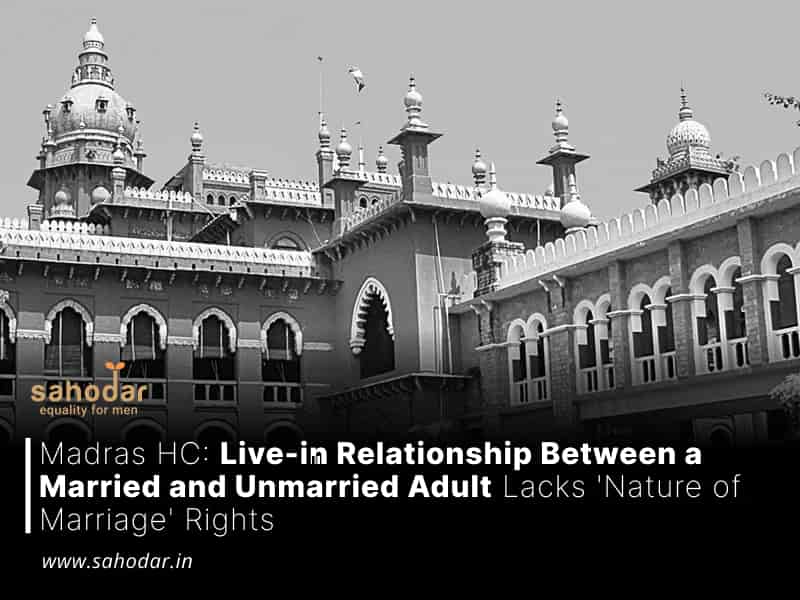Madras High Court has observed that by entering such a relationship, the appellant has committed an intentional tort, namely interference in the marital relationship with intentionally alienating him from his wife and children
Madras High Court
In an appeal filed under Section 96 of the Code of Civil Procedure, 1908 (CPC), seeking to overturn the judgment and decree of the Additional District and Session Judge, Justice Teeka Raman, the court stated that since the appellant’s wife was alive and there was no divorce according to the codified personal law for Christians, his association with the deceased cannot be termed a live-in relationship. Therefore, the appellant cannot claim succession or inheritance rights to the property.
Upholding the judgment and decree of the Additional District and Session Judge, the court ruled that, as per Section 45 of the Indian Succession Act (ISA), the property would pass to the newly impleaded parties after the father’s death.
Background
The respondent, now deceased, was the father of the deceased, who worked as a Headmistress in Panchayat Union School. She lived with the appellant, who was already married. Since the appellant’s marriage was still valid, he cohabited with the deceased without marriage. The appellant transferred a settlement deed to her on 09-08-2010, and she died on 24-01-2013. The dispute arose over who was the rightful heir to her property after her death.
The Trial Court concluded that the alleged marriage between the appellant and the deceased could not be legally proven. Additionally, since the appellant’s marriage was still valid, his relationship with the deceased was not a live-in relationship. Thus, the property would go to the father as the legal heir. The appellant, aggrieved by this decision, filed the present appeal.
Issues and Analysis:
Was the deceased the appellant’s wife as he claimed?
Referring to Section 60 of the Christian Marriage Act (CMA), the court noted that monogamy is a requirement for marriage under the CMA. The appellant claimed he had obtained a customary divorce from his first wife, making his marriage to the deceased legal. However, the court pointed out that Section 10 of the Divorce Act does not recognize customary divorce, and the appellant had no evidence to support his claim. Thus, his marriage with his first wife was still valid, and he could not have legally married the deceased.
Does the alleged “live-in relationship” grant legal status to the appellant as the deceased’s husband?
The court determined that since the appellant’s marriage to his first wife was still valid and monogamy is a precondition for a valid marriage under the CMA, the alleged live-in relationship between the appellant and the deceased could not override the legal marriage.
Is the alleged marriage between the appellant and the deceased valid or legally sustainable?
The court noted that the deceased nominating the appellant as her husband in her service records was a self-declaration and did not confer legal status as a wife. Since the appellant’s first marriage was not legally dissolved, his marriage with the deceased was invalid.
Is the father the legal heir of the deceased under the Succession Act, 1925?
Due to the invalidity of the appellant’s marriage with the deceased, the court ruled that the relationship could not be termed a ‘live-in’ relationship. The appellant could not claim succession or inheritance rights over the deceased’s property. According to the settlement deed, the deceased was the absolute owner of the property, and the father, being the sole surviving legal heir, was entitled to the property under Section 42 of the ISA. The court upheld the district judge’s order, stating that the respondent is entitled to succeed to the property.
Is the father entitled to a declaration of title to the property?
The court stated that the property had been validly transferred to the deceased as a gift deed under Section 122 of the Transfer of Property Act. Since the father was the sole legal heir, he was entitled to the property under Section 42 of the ISA and to the declaration of the title deed.
The court also distinguished between a relationship in the nature of marriage and a marital relationship. Citing Indra Sarma v. V.K.V. Sarma (2013) 15 SCC 755, the court explained that a marital relationship subsists as long as it has legal status, even if the spouses do not live together. In contrast, a live-in relationship ends when the parties decide to separate. In this case, the court noted that the appellant had a subsisting marriage and five children, and his relationship with the deceased could not be considered a marital one. The presumption that a man and woman living together are a marital couple did not apply here, as the appellant was already married and the deceased was his concubine. The relationship was not monogamous and, therefore, not in the nature of marriage. The court stated that the appellant had committed an intentional tort by entering such a relationship and criticized the misuse of the term ‘live-in’ relationship in extramarital affairs.
Is this conversation helpful so far?

